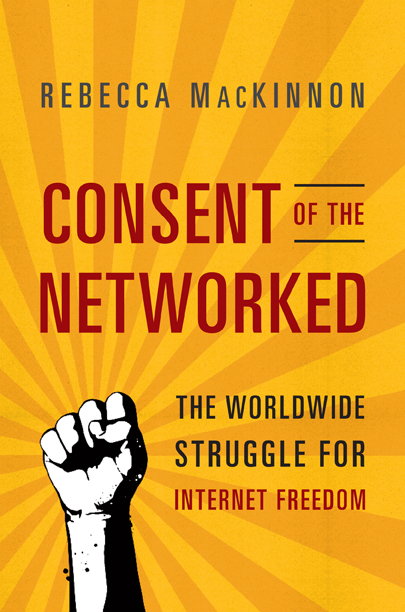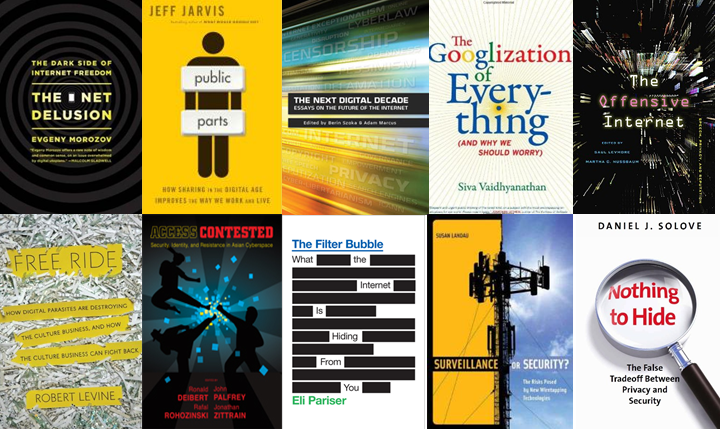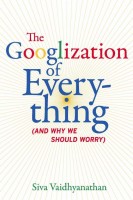 Rebecca MacKinnon’s new book, Consent of the Networked: The Worldwide Struggle for Internet Freedom, is well-researched exploration of the forces driving Internet developments and policy across the globe today. She serves up an outstanding history of recent global protest movements and social revolutions and explores the role that Internet technologies and digital networks played in those efforts. She also surveys some of the recent policy fights here and abroad over issues such as online privacy, Net neutrality regulation, free speech matters, and the copyright wars. The Consent of the Networked is certainly worth reading and will go down as one of the most important Internet policy books of 2012.
Rebecca MacKinnon’s new book, Consent of the Networked: The Worldwide Struggle for Internet Freedom, is well-researched exploration of the forces driving Internet developments and policy across the globe today. She serves up an outstanding history of recent global protest movements and social revolutions and explores the role that Internet technologies and digital networks played in those efforts. She also surveys some of the recent policy fights here and abroad over issues such as online privacy, Net neutrality regulation, free speech matters, and the copyright wars. The Consent of the Networked is certainly worth reading and will go down as one of the most important Internet policy books of 2012.
A Call to Action
Of course, it’s not just a history lesson. MacKinnon has also issued a call-to-arms here. As a well-known web activist, MacKinnon has emerged as a leading force in the broad-based, if loosely-defined, “Net freedom” movement. The term “Net freedom,” she notes, means very different things to different people. It’s “like a Rorschach inkblot test: different people look at the same ink splotch and see very different things.” (p. 188) Nonetheless, on the global stage, the Internet freedom movement is fundamentally tied up with efforts to hold both governments and corporate actors more accountable for their actions toward the Netizens, digital networks, and online speech and expression. Continue reading →
 My latest Forbes column is entitled “Why Doesn’t Society Just Fall Apart?” and it’s a short review of Bruce Schneier’s latest book, Liars & Outliers: Enabling the Trust that Society Needs to Thrive. It’s an interesting exploration of the societal pressures that combine to ensure that (most!) societies don’t go off the rails and end in anarchic violence. In particular, he identifies and discusses four “societal pressures” combine to help create and preserve trust within society. Those pressures include: (1) Moral pressures; (2) Reputational pressures; (3) Institutional pressures; and (4) Security systems. By “dialing in” these societal pressures in varying degrees, trust is generated over time within groups.
My latest Forbes column is entitled “Why Doesn’t Society Just Fall Apart?” and it’s a short review of Bruce Schneier’s latest book, Liars & Outliers: Enabling the Trust that Society Needs to Thrive. It’s an interesting exploration of the societal pressures that combine to ensure that (most!) societies don’t go off the rails and end in anarchic violence. In particular, he identifies and discusses four “societal pressures” combine to help create and preserve trust within society. Those pressures include: (1) Moral pressures; (2) Reputational pressures; (3) Institutional pressures; and (4) Security systems. By “dialing in” these societal pressures in varying degrees, trust is generated over time within groups.
Of course, these societal pressures also fail on occasion, Schneier notes. He explores a host of scenarios — in organizations, corporations, and governments — when trust breaks down because defectors seek to evade the norms and rules the society lives by. These defectors are the “liars and outliers” in Schneier’s narrative and his book is an attempt to explain the complex array of incentives and trade-offs that are at work and which lead some humans to “game” systems or evade the norms and rules others follow. Continue reading →
It’s time again to look back at the major cyberlaw and information tech policy books of the year. I’ve decided to drop the top 10 list approach I’ve used in past years (see 2008, 2009, 2010) and just use a more thematic listing of major titles released in 2011. This thematic approach gets me out of hot water since I have found that people take numeric lists very seriously, especially when they are the author of one of the books and their title isn’t #1 on the list! Nonetheless, at the end, I will name what I regard as the most important Net policy book of the year.

I hope I’ve included all the major titles released during the year, but I ask readers to please let me know what I have missed that belongs on this list. I want this to be a useful resource to future scholars and students in the field. [Reminder: Here’s my compilation of major Internet policy books from the past decade.] Where relevant, I’ve added links to my reviews as well as discussions with the authors that Jerry Brito conducted as part of his “Surprisingly Free” podcast series. Finally, as always, I apologize to international readers for the somewhat U.S.-centric focus of this list.
Continue reading →
 Earlier this year I read Scott Cleland’s new book, Search & Destroy: Why You Can’t Trust Google, Inc., after he was kind enough to send me an advance copy. I didn’t have time to review it at the time and just jotted down a few notes for use later. Because the year is winding down, I figured I should get my thoughts on it out now before I publish my end of year compendium of important tech policy books.
Earlier this year I read Scott Cleland’s new book, Search & Destroy: Why You Can’t Trust Google, Inc., after he was kind enough to send me an advance copy. I didn’t have time to review it at the time and just jotted down a few notes for use later. Because the year is winding down, I figured I should get my thoughts on it out now before I publish my end of year compendium of important tech policy books.
Cleland is President of Precursor LLC and a noted Beltway commentator on information policy issues, especially Net neutrality regulation, which he has vociferously railed against for many years. On a personal note, I’ve known Scott for many years and always enjoyed his analysis and wit, even when I disagree with the thrust of some of it.
And I’m sad to report that I disagree with most of it in Search & Destroy, a book that is nominally about Google but which is really a profoundly skeptical look at the modern information economy as we know it. Indeed, Cleland’s book might have been more appropriately titled, “Second Thoughts about Cyberspace.” In a sense, it represents an outline for an emerging “cyber-conservative” vision that aims to counter both “cyber-progressive” and “cyber-libertarian” schools of thinking.
After years of having Scott’s patented bullet-point mini-manifestos land in my mailbox, I think it’s only appropriate I write this review in the form of a bulleted list! So, here it goes.. Continue reading →
 Twenty years ago, one of the best books ever penned about freedom of speech was released. Sadly, many people still haven’t heard of it. That book was Freedom, Technology and the First Amendment, by Jonathan Emord. With the exception of Ithiel de Sola Pool’s 1983 masterpiece Technologies of Freedom: On Free Speech in an Electronic Age, no book has a more profound impact on my thinking about free speech and technology policy than Emord’s 1991 classic. Emord’s book is, at once, a magisterial history and a polemical paean. This is no wishy-washy apologia for free speech, rather, it is a celebration of the amazing gift of freedom that the Founding Fathers gave us with the very first amendment to our constitution.
Twenty years ago, one of the best books ever penned about freedom of speech was released. Sadly, many people still haven’t heard of it. That book was Freedom, Technology and the First Amendment, by Jonathan Emord. With the exception of Ithiel de Sola Pool’s 1983 masterpiece Technologies of Freedom: On Free Speech in an Electronic Age, no book has a more profound impact on my thinking about free speech and technology policy than Emord’s 1991 classic. Emord’s book is, at once, a magisterial history and a polemical paean. This is no wishy-washy apologia for free speech, rather, it is a celebration of the amazing gift of freedom that the Founding Fathers gave us with the very first amendment to our constitution.
Unlike most people, Emord assumes nothing about the nature and purpose of the First Amendment; instead, he starts in pre-colonial times and explains how our rich heritage of freedom of speech and expression came about. Like Pool, Emord also makes the case for equality of all press providers and debunks the twisted logic behind much of this century’s corrupt jurisprudence governing speech transmitted via electronic media. Pool and Emord make it clear that if the First Amendment is retain its true meaning and purpose as a bulwark against government control of speech and expression, electronic media providers (TV, radio, cable, the Internet) must be accorded full First Amendment freedoms on par with traditional print media (newspapers, magazines, books and journals). Continue reading →
My thanks to Linton Weeks of NPR who reached out to me for comment for a story he was doing on the impact of the Internet and digital technology on culture and our attention spans. His essay, “We Are Just Not Digging The Whole Anymore,” is an interesting exploration of the issue, although it is clear that Weeks, like Nick Carr (among others), is concerned about what the Net is doing to our brains. He says:
We just don’t do whole things anymore. We don’t read complete books — just excerpts. We don’t listen to whole CDs — just samplings. We don’t sit through whole baseball games — just a few innings. Don’t even write whole sentences. Or read whole stories like this one. We care more about the parts and less about the entire. We are into snippets and smidgens and clips and tweets. We are not only a fragmented society, but a fragment society. And the result: What we gain is the knowledge — or the illusion of knowledge — of many new, different and variegated aspects of life. What we lose is still being understood.
After reading the entire piece I realized that some of my comments to Weeks probably came off as a bit more pessimistic about things than I actually am. I told him, for example, that “Long-form reading, listening and viewing habits are giving way to browse-and-choose consumption,” and that “With the increase in the number of media options — or distractions, depending on how you look at them — something has to give, and that something is our attention span.”
Luckily, however, Weeks was kind enough to also give me the last word in the story in which I pointed out that it would be a serious mistake to conclude “that we’re all growing stupid, or losing our ability to think, or losing our appreciation of books, albums or other types of long-form content.” Instead, I argued: Continue reading →
 On numerous occasions here and elsewhere I have cited the enormous influence that Virginia Postrel’s 1998 book, The Future and Its Enemies, has had on me. Her “dynamist” versus “stasis” paradigm helps us frame and better understand almost all debates about technological progress. I cannot recommend that book highly enough.
On numerous occasions here and elsewhere I have cited the enormous influence that Virginia Postrel’s 1998 book, The Future and Its Enemies, has had on me. Her “dynamist” versus “stasis” paradigm helps us frame and better understand almost all debates about technological progress. I cannot recommend that book highly enough.
In her latest Wall Street Journal column, Postrel considers what makes the iPad such a “magical” device and in doing so, she takes on the logical set forth in Jonathan Zittrain 2009 book, The Future of the Internet and How to Stop It, although she doesn’t cite the book by name in her column. You will recall that in that book and his subsequent essays, Prof. Zittrain made Steve Jobs and his iPhone out to be the great enemy of digital innovation — at least as Zittrain defined it. How did Zittrain reach this astonishing conclusion and manage to turn Jobs into a pariah and his devices into the supposed enemy of innovation? It came down to “generativity,” Zittrain said, by which he meant technologies or networks that invite or allow tinkering and all sorts of creative uses. Zittrain worships general-purpose personal computers and the traditional “best efforts” Internet. By contrast, he decried “sterile, tethered” digital “appliances” like the iPhone, which he claimed limited generativity and innovation, mostly because of their generally closed architecture.
In her column, Postrel agrees that the iPad is every bit as closed as Zittrain feared iPhone successor devices would be. She notes: “customers haven’t the foggiest idea how the machine works. The iPad is completely opaque. It is a sealed box. You can’t see the circuitry or read the software code. You can’t even change the battery.” But Postrel continues on to explain why the hand-wringing about perfect openness is generally overblown and, indeed, more than a bit elitist: Continue reading →
 In one sense, Siva Vaidhyanathan’s new book, The Googlization of Everything (And Why Should Worry), is exactly what you would expect: an anti-Google screed that predicts a veritable techno-apocalypse will befall us unless we do something to deal with this company that supposedly “rules like Caesar.” (p. xi) Employing the requisite amount of panic-inducing Chicken Little rhetoric apparently required to sell books these days, Vaidhyanathan tells us that “the stakes could not be higher,” (p. 7) because the “corporate lockdown of culture and technology” (p. xii) is imminent.
In one sense, Siva Vaidhyanathan’s new book, The Googlization of Everything (And Why Should Worry), is exactly what you would expect: an anti-Google screed that predicts a veritable techno-apocalypse will befall us unless we do something to deal with this company that supposedly “rules like Caesar.” (p. xi) Employing the requisite amount of panic-inducing Chicken Little rhetoric apparently required to sell books these days, Vaidhyanathan tells us that “the stakes could not be higher,” (p. 7) because the “corporate lockdown of culture and technology” (p. xii) is imminent.
After lambasting the company in a breathless fury over the opening 15 pages of the book, Vaidhyanathan assures us that “nothing about this means that Google’s rule is as brutal and dictatorial as Caesar’s. Nor does it mean that we should plot an assassination,” he says. Well, that’s a relief! Yet, he continues on to argue that Google is sufficiently dangerous that “we should influence—even regulate—search systems actively and intentionally, and thus take responsibility for how the Web delivers knowledge.” (p. xii) Why should we do that? Basically, Google is just too damn good at what it does. The company has the audacity to give consumers exactly what they want! “Faith in Google is dangerous because it increases our appetite for goods, services, information, amusement, distraction, and efficiency.” (p. 55) That is problematic, Vaidhyanathan says, because “providing immediate gratification draped in a cloak of corporate benevolence is bad faith.” (p. 55) But this begs the question: What limiting principle should be put in place to curb our appetites, and who or what should enforce it? Continue reading →
Tomorrow at noon Facebook will be hosting one of its [“Facebook DC Live” events featuring William Powers](http://www.facebook.com/event.php?eid=168939799819747), author of *[Hamlet’s Blackberry: A Practical Philosophy for Building a Good Life](http://www.amazon.com/gp/product/0061687162?ie=UTF8&tag=jerrybritocom&linkCode=as2&camp=1789&creative=390957&creativeASIN=0061687162)*. I interviewed Powers on [the Surprisingly Free podcast](http://surprisinglyfree.com/2010/10/26/william-powers/) last year about his book.
What I like so much about Powers and his books is that he gracefully tackles what is no doubt a fact: that like all new technologies the Internet comes not just with benefits, but with costs as well. In the Internet’s case the costs that most folks have identified have to do with “what it’s doing to our brains” and attention spans. Unlike other authors on the same topic that I’ve read and interviewed, like Nick Carr, Jaron Lanier, Susan Maushart, and Elias Aboujaoude, Powers doesn’t overplay his concern or sound alarm bells of doom. Instead, he gives a very upbeat account of how great minds throughout history have dealt with technological change.
The punchline: be mindful of your action, and take a break once in a while. Wonderful advice wrapped in great stories and good philosophy; cyber-doom need not apply. So, check him out on the live stream tomorrow and you’ll be able to chat and ask questions.
In his [column on Monday](http://www.nytimes.com/2011/02/15/opinion/15brooks.html?ref=davidbrooks), David Brooks put his finger on what I found most interesting about Tyler Cowen’s *[The Great Stagnation](http://www.amazon.com/gp/product/B004H0M8QS?ie=UTF8&tag=jerrybritocom)*. Namely:
>It could be that in an industrial economy people develop a materialist mind-set and believe that improving their income is the same thing as improving their quality of life. But in an affluent information-driven world, people embrace the postmaterialist mind-set. They realize they can improve their quality of life without actually producing more wealth.
As Tyler points out in this book, and catalogued at length in his other excellent book, *[Create Your Own Economy](http://www.amazon.com/gp/product/B002XULWOS?ie=UTF8&tag=jerrybritocom)*, recent increases in happiness come from growth in internal economies. That is, internal to humans. In the past, increased well-being came from not having a toilet and then having one, or the invention of cheap air travel. Today they come from blogging, watching *Lost* on Netflix, listening to a symphony from iTunes, tweeting with your friends, seeing their pictures on Facebook or Path, and learning and collaborating on Wikipedia. As a result, once one secures a certain income to cover basic needs, greater happiness and well-being can be had for virtually nothing.
The problem some see with this is that the Internet sector, while it may give us amazing innovations, produces little by way of revenue or jobs. Brooks also laments that because American’s have not come to grips with this growing distinction between wealth and standard of living, we tend to live beyond our means, which is certainly true in a personal and public fiscal sense.
But I’d like to see this seeming decoupling of wealth and well-being as an opportunity.
Continue reading →
 Rebecca MacKinnon’s new book, Consent of the Networked: The Worldwide Struggle for Internet Freedom, is well-researched exploration of the forces driving Internet developments and policy across the globe today. She serves up an outstanding history of recent global protest movements and social revolutions and explores the role that Internet technologies and digital networks played in those efforts. She also surveys some of the recent policy fights here and abroad over issues such as online privacy, Net neutrality regulation, free speech matters, and the copyright wars. The Consent of the Networked is certainly worth reading and will go down as one of the most important Internet policy books of 2012.
Rebecca MacKinnon’s new book, Consent of the Networked: The Worldwide Struggle for Internet Freedom, is well-researched exploration of the forces driving Internet developments and policy across the globe today. She serves up an outstanding history of recent global protest movements and social revolutions and explores the role that Internet technologies and digital networks played in those efforts. She also surveys some of the recent policy fights here and abroad over issues such as online privacy, Net neutrality regulation, free speech matters, and the copyright wars. The Consent of the Networked is certainly worth reading and will go down as one of the most important Internet policy books of 2012.






 The Technology Liberation Front is the tech policy blog dedicated to keeping politicians' hands off the 'net and everything else related to technology.
The Technology Liberation Front is the tech policy blog dedicated to keeping politicians' hands off the 'net and everything else related to technology.